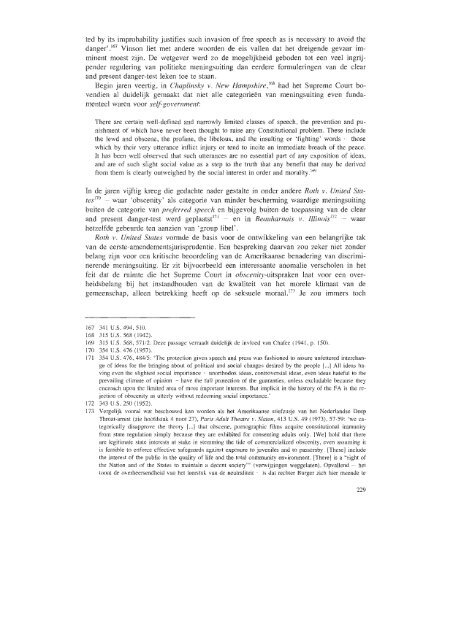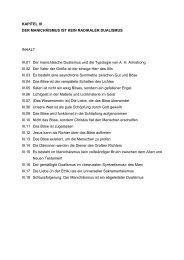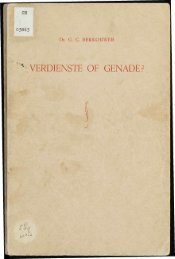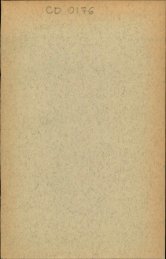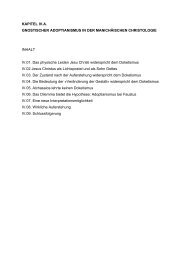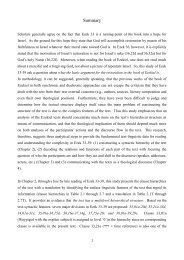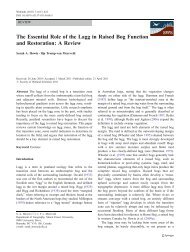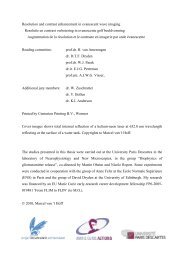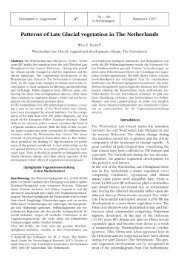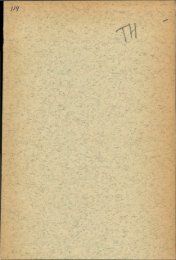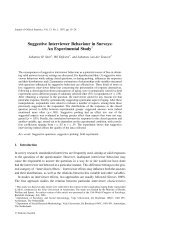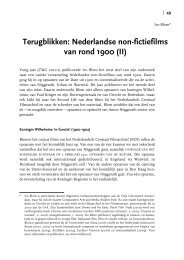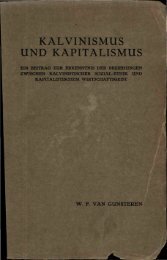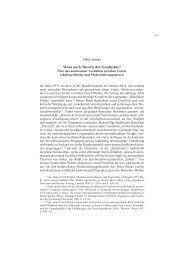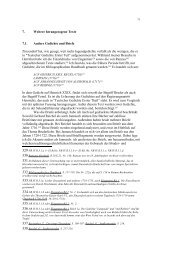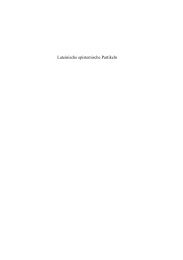Deel II: De Amerikaanse benadering - VU-DARE Home
Deel II: De Amerikaanse benadering - VU-DARE Home
Deel II: De Amerikaanse benadering - VU-DARE Home
Create successful ePaper yourself
Turn your PDF publications into a flip-book with our unique Google optimized e-Paper software.
ted by its improbability justifies such invasion of free speech as is necessary to avoid the<br />
danger 5<br />
. 167<br />
Vinson liet met andere woorden de eis vallen dat het dreigende gevaar im<br />
minent moest zijn. <strong>De</strong> wetgever werd zo de mogelijkheid geboden tot een veel ingrij<br />
pender regulering van politieke meningsuiting dan eerdere formuleringen van de clear<br />
and present danger-test leken toe te staan.<br />
Begin jaren veertig, in Chaplinsky v. New Hampshire , m<br />
had het Supreme Court bo<br />
vendien al duidelijk gemaakt dat niet alle categorieën van meningsuiting even funda<br />
menteel waren voor self-government:<br />
There are certain well-defined and narrowly limited classes of speech, the prevention and punishment<br />
of which have never been thought to raise any Constitutional problem, These include<br />
the lewd and obscene, the profane, the libelous, and the insulting or 'fighting' words — those<br />
which by their very utterance inflict injury or tend to incite an immediate breach of the peace.<br />
It has been well observed that such uiterances are no essential part of any exposition of ideas,<br />
and are of such slight social value as a step to the troth that any benefit that may be derived<br />
from them is clearly outweighed by the social interest in order and morality. 160<br />
In de jaren vijftig kreeg die gedachte nader gestalte in onder andere Roth v. United Sta<br />
tes 110<br />
— waar 'obscenity' als categorie van minder bescherming waardige meningsuiting<br />
buiten de categorie van preferred speech en bijgevolg buiten de toepassing van de clear<br />
and present danger-test werd geplaatst 171<br />
hetzelfde gebeerde ten aanzien van 'group libel'.<br />
— en in Beauharnais v. Illinois 112<br />
Roth v. United States vormde de basis voor de ontwikkeling van een belangrijke tak<br />
van de eerste-amendementsjurisprudentie. Een bespreking daarvan zou zeker niet zonder<br />
belang zijn voor een kritische beoordeling van de <strong>Amerikaanse</strong> <strong>benadering</strong> van discrimi<br />
nerende meningsuiting. Er zit bijvoorbeeld een interessante anomalie verscholen in het<br />
feit dat de ruimte die het Supreme Court in ohscenity-mtsprak.cn laat voor een over<br />
heidsbelang bij het instandhouden van de kwaliteit van het morele klimaat van de<br />
gemeenschap, alleen betrekking heeft op de seksuele moraal. 173<br />
waar<br />
Je zou immers toch<br />
167 341 U.S. 494, 510.<br />
168 315 U.S. 568 (1942).<br />
169 315 U.S. 568, 571/2. <strong>De</strong>ze passage verraadt duidelijk de invloed van Chafee (1941, p. 150).<br />
170 354 U.S. 476 (1957),<br />
171 354 U.S. 476, 484/5; 'The protection given speech and press was fashioned to assure unfettered interchange<br />
of ideas for the bringing about of political and social changes desired by the people [...! All ideas having<br />
even the slightest social importance unorthodox ideas, controversial ideas, even ideas hateful to the<br />
prevailing climate of opinion - have the toll protection of the guaranties, unless excludable because (hey<br />
encroach upon the limited area of more important interests. But implicit in the history of the FA is the rejection<br />
of obscenity as utterly without redeeming social importance/<br />
172 343 U.S. 250 (1952).<br />
173 Vergelijk vooral wat beschouwd kan worden als het <strong>Amerikaanse</strong> stiefzusje van net Nederlandse <strong>De</strong>ep<br />
Throat-arrest (zie hoofdstuk 4 noot 27), Paris Adult Theatre v. Slaton, 413 U.S. 49 (1973), 57-59; 'we categorically<br />
disapprove the theory [...] that obscene, pornographic films acquire constitutional immunity<br />
from state regulation simply because they are exhibited for consenting adults only, [We] hold that there<br />
are legitimate state interests at stake in stemming the tide of commercialized obscenity, even assuming it<br />
is feasible to enforce effective safeguards against exposure to juveniles and to passersby, [These] include<br />
the interest of the public in the quality of life and the total community environment. [There] is a "right of<br />
the Nation and of the States to maintain a decent society" 5<br />
(verwijzingen weggelaten). Opvallend — het<br />
toont de overheersendheid van het leerstuk van de neutraliteit is dat reenter Burger zich hier rneende te<br />
229


